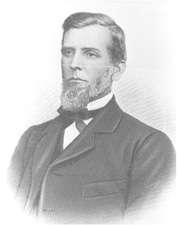Jacob W. Miller
Jacob Welsh Miller (August 29, 1800 – September 30, 1862) was a United States Senator from New Jersey.
Jacob Welsh Miller | |
|---|---|
 | |
| United States senator from New Jersey | |
| In office March 4, 1841 – March 3, 1853 | |
| Preceded by | Garret D. Wall |
| Succeeded by | William Wright |
| Member of the New Jersey Senate | |
| In office 1839-1840 | |
| Personal details | |
| Born | August 29, 1800 Washington Township, New Jersey |
| Died | September 30, 1862 (aged 62) Morristown, New Jersey |
| Political party | Whig |
Biography
In 1800, Miller was born in German Valley, New Jersey (in Washington Township, Morris County), United States, North America. He attended the public schools, studied law, was admitted to the bar in 1823, and practiced in Morristown.
In 1825, Miller married Mary Louisa Macculloch, the daughter of George P. Macculloch, a wealthy Morristown engineer and businessman who had designed and built the Morris Canal. They had nine children, one of whom was Captain Lindley Miller, who served as an officer of a black infantry regiment during the Civil War and wrote "Marching Song of the First Arkansas".
In 1832, Miller was elected to the New Jersey General Assembly. From 1839 to 1840, he then represented Morris County in the New Jersey Legislative Council (now the New Jersey Senate).
In 1840, Miller was elected as a Whig to the U.S. Senate, was reelected in 1846, and served from March 4, 1841, to March 3, 1853. While in the Senate, he was chairman of the Committee on the District of Columbia (Twenty-seventh and Twenty-eighth Congresses).
In 1862, Miller died in Morristown, New Jersey. He was interred in St. Peter's Parish Churchyard.
References
Bibliography
- United States Congress. "Jacob W. Miller (id: M000731)". Biographical Directory of the United States Congress.
- Macculloch-Miller Family Archives, Macculloch Hall Historical Museum, Morristown, NJ.
| U.S. Senate | ||
|---|---|---|
| Preceded by Garret D. Wall |
U.S. senator (Class 2) from New Jersey 1841–1853 Served alongside: Samuel L. Southard, William L. Dayton, Robert F. Stockton |
Succeeded by William Wright |
